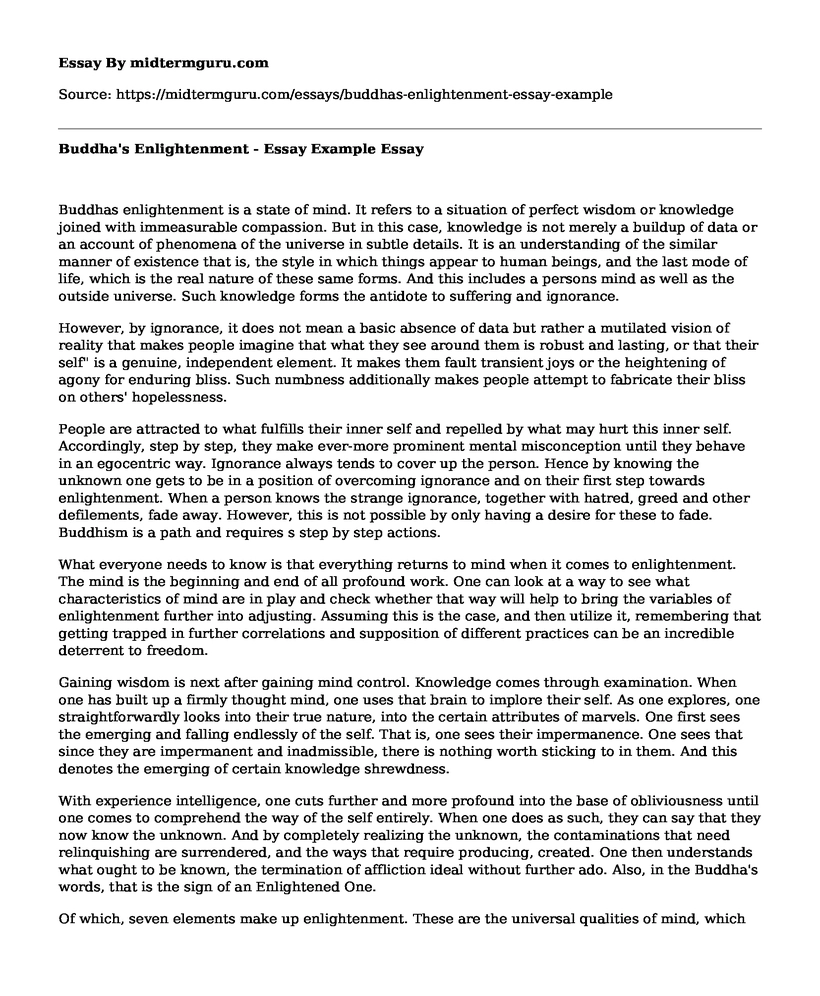Buddhas enlightenment is a state of mind. It refers to a situation of perfect wisdom or knowledge joined with immeasurable compassion. But in this case, knowledge is not merely a buildup of data or an account of phenomena of the universe in subtle details. It is an understanding of the similar manner of existence that is, the style in which things appear to human beings, and the last mode of life, which is the real nature of these same forms. And this includes a persons mind as well as the outside universe. Such knowledge forms the antidote to suffering and ignorance.
However, by ignorance, it does not mean a basic absence of data but rather a mutilated vision of reality that makes people imagine that what they see around them is robust and lasting, or that their self" is a genuine, independent element. It makes them fault transient joys or the heightening of agony for enduring bliss. Such numbness additionally makes people attempt to fabricate their bliss on others' hopelessness.
People are attracted to what fulfills their inner self and repelled by what may hurt this inner self. Accordingly, step by step, they make ever-more prominent mental misconception until they behave in an egocentric way. Ignorance always tends to cover up the person. Hence by knowing the unknown one gets to be in a position of overcoming ignorance and on their first step towards enlightenment. When a person knows the strange ignorance, together with hatred, greed and other defilements, fade away. However, this is not possible by only having a desire for these to fade. Buddhism is a path and requires s step by step actions.
What everyone needs to know is that everything returns to mind when it comes to enlightenment. The mind is the beginning and end of all profound work. One can look at a way to see what characteristics of mind are in play and check whether that way will help to bring the variables of enlightenment further into adjusting. Assuming this is the case, and then utilize it, remembering that getting trapped in further correlations and supposition of different practices can be an incredible deterrent to freedom.
Gaining wisdom is next after gaining mind control. Knowledge comes through examination. When one has built up a firmly thought mind, one uses that brain to implore their self. As one explores, one straightforwardly looks into their true nature, into the certain attributes of marvels. One first sees the emerging and falling endlessly of the self. That is, one sees their impermanence. One sees that since they are impermanent and inadmissible, there is nothing worth sticking to in them. And this denotes the emerging of certain knowledge shrewdness.
With experience intelligence, one cuts further and more profound into the base of obliviousness until one comes to comprehend the way of the self entirely. When one does as such, they can say that they now know the unknown. And by completely realizing the unknown, the contaminations that need relinquishing are surrendered, and the ways that require producing, created. One then understands what ought to be known, the termination of affliction ideal without further ado. Also, in the Buddha's words, that is the sign of an Enlightened One.
Of which, seven elements make up enlightenment. These are the universal qualities of mind, which the Buddhas describes as the items of an appropriate divine exercise. A mind in which all these elements, well balanced and developed, experiences freedom. Three of these aspects are unreceptive elements. They are tranquility or quietness of mind; equanimity, or balance and detachment of mind in the face of change; concentration, or one-pointedness of mind. The other aspects are active elements. These are an investigation, or silent scrutiny of the things happening; effort, which is the desire to be mindful; and rapture, that reveals as ecstasy and a compelling concern in the spiritual practice.
The seventh factor is mindfulness, and it is the key to practice. The advancement of this particular state of mind inevitably advances all of the former elements. Mindfulness, noting the item in the current moment, also has the purpose of bringing these aspects into appropriate balance. Utilizing the components of edification once can assess the entire scope of religious ways. Some will build up the vitality elements even more quickly or firmly. Others reinforce serenity or fixation all the more rapidly. No one should be worried about the type of the practice or the words or style of the instructing when on their way to enlightenment. Just check whether it will prompt to the improvement of these elements.
Therefore, using the elements of enlightenment, one can assess the whole variety of spiritual paths since enlightenment is a state of mind. The world has vast fields of study. But, if what a person needs more than anything else is enlightenment, then it is ideal to focus totally on that point and assemble all the information that is straightforwardly significant to attaining enlightenment.
Cite this page
Buddha's Enlightenment - Essay Example. (2021, May 26). Retrieved from https://midtermguru.com/essays/buddhas-enlightenment-essay-example
If you are the original author of this essay and no longer wish to have it published on the midtermguru.com website, please click below to request its removal:
- Paper Sample on the Roman Catholic Church
- Essay on the Holy Spirit Christian World View
- 09/11 Attaks Effects on International Regulations of Islamic Charities
- Historical and Cultural Background of the Meaning Development of the Christian Texts - Paper Example
- Essay Sample About the God Zeus
- Paper Example on Gospel Essentials
- Christian Values: Essential in Life, Interacting With Others - Essay Sample







